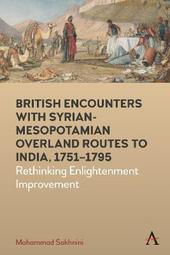
|
British Encounters with Syrian-Mesopotamian Overland Routes to India, 1751-1795: Rethinking Enlightenment Improvement
Hardback
Main Details
| Title |
British Encounters with Syrian-Mesopotamian Overland Routes to India, 1751-1795: Rethinking Enlightenment Improvement
|
| Authors and Contributors |
By (author) Mohammad Sakhnini
|
| Series | Anthem Studies in Travel |
|---|
| Physical Properties |
| Format:Hardback | | Pages:250 | | Dimensions(mm): Height 229,Width 153 |
|
| Category/Genre | Literature - history and criticism |
|---|
| ISBN/Barcode |
9781785279362
|
| Classifications | Dewey:820.9325609033 |
|---|
| Audience | | Professional & Vocational | |
|---|
|
Publishing Details |
| Publisher |
Anthem Press
|
| Imprint |
Anthem Press
|
| NZ Release Date |
14 March 2023 |
| Publication Country |
United Kingdom
|
Description
The book examines the relationship between the Enlightenment idea of improvement and eighteenth-century travel writings about Middle Eastern overland routes to India. This book argues that eighteenth-century British travel writings about the Arabian overland routes to India offered fascinating anecdotes of encounters that allow us to rethink Enlightenment understanding of the meaning of improvement. Travelling among and writing about the inhabitants, government, culture, religion and ruins of Syria and Mesopotamia offered Britons opportunities to pose themselves in their narratives as men of improvement abroad. To that end, travelling appeared in their books as a serious attempt to improve their readers' knowledge about a region that many in Britain saw as decayed, barbaric and primitive. But the various encounters British travellers experienced in the region allowed them to negotiate the impact of excessive materialism on the traditions, morality, religion, and landscape of eighteenth-century Britain. At the heart of this book's understanding of Enlightenment writings about the Levant is the idea that a journey in a region which many considered as a theatre for the arts, sciences and military conquests in the past and decay in the present represents a fraught relationship modern Europeans had with the past, present and future. As this book shows, different British responses to the material conditions of the Arab region and its inhabitants were mapped onto some British debates about the viability of modern commercial societies and the apparently intractable problem of securing a more benign relationship between material advance and virtue, modernity and traditions, improvement and backwardness. These debates reflected some significant transformations of the period: fears of French invasion during the Seven Years Wars, Enclosure Acts and the Jacobite Rebellion, the corruption of East India Company, the crisis of the American colonies and French Revolution, and the debate over slavery of the 1790s. En route, Britons raised concerns about a host of religious, political and ethical questions that troubled eighteenth-century Britain: Is moral corruption a necessary price a society has to pay in return for living in a materially advanced state? Do people need to honour traditions and religion in modern commercial society in which people have never been freer? Can one find virtue and morality in commercial society? Can an advanced and enlightened society tolerate religion? How can it be that a wealthy society also has poor and dispossessed people who live in workhouses? How is it possible that a society which respects Enlightenment values of freedom and liberty also practices slavery and colonises other societies? European travellers in the Levant often found themselves confronting these questions, especially in a region known for being grand and great in the past but barren and full of ruins in the present.
Author Biography
Mohammad Sakhnini is a senior lecturer in English studies at Khalifa University of Science and Technology, UAE.
|